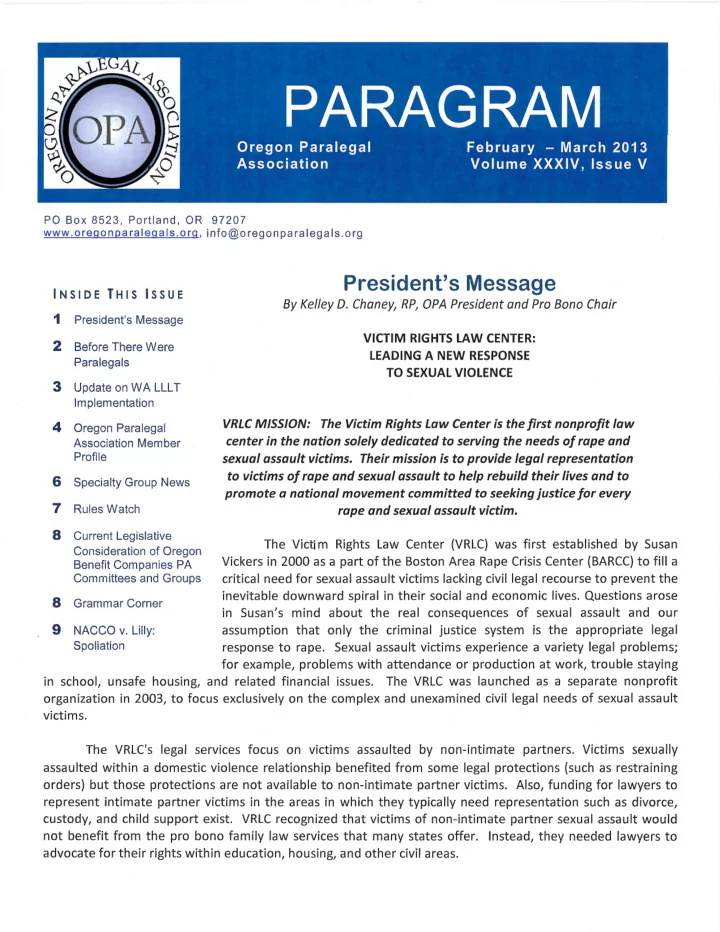

Page 8 The Paragram Under the proposed new law, benefit companies may amend their articles and no longer be benefit companies. Under Oregon HB 2296, the benefit company's articles may identify a general or specific public benefit. However, specifying a specific public benefit does not limit the benefit company's obligation to fulfill the purposes outlined in the new law. Further, all benefit companies must prepare a benefit report under specific guidelines to show the benefit company met or exceeded a nonaffiliated third ‐ party standard (see definition for third ‐ party standard in the proposed law). The company's benefit report must be publicly available at no charge. There are limits on the liability of the governors of a benefit corporation. "Governor" means a director of a corporation that is a benefit company, a member in a member ‐ managed limited liability company that is a benefit company or a manager in a manager ‐ managed limited liability company that is a benefit company. Oregon Senate Bill 144 (http://www.leg.state.or.us/13reg/measpdf/sb0100.dir/sb0144.intro.pdf) appears to be the Senate version of HB 2296. Oregon House Bill 2318 (http://www.leg.state.or.us/13reg/measpdf/hb2300.dir/hb2318.intro.pdf) proposes the allowance of benefit corporations, without any provision for benefit limited liability companies. The definition of "general public benefit" varies from the definition provided in Oregon HB 2296 and SB 144. Oregon HB 2318 also provides a definition for "specific public benefit," while Oregon HB 2296 and SB 144 do not have this definition provided in their proposed laws. Oregon HB 2318 does not use or have provisions for a "Governor" as outlined in Oregon HB 2296 and SB 144. Under the provisions of Oregon HB 2318, a benefit corporation may amend its articles of incorporation to become another entity other than a benefit corporation. The financial reporting requirements for a benefit corporation under Oregon HB 2318 are similar to those of a nonprofit corporation and far exceed the reporting requirements outlined in Oregon HB 2296 and SB 144. We will continue to monitor these pieces of legislation and provide updates to the changes in the proposed laws and their status. Grammar Corner: Is the principal your pal? Many people learn that saying "the principal is my pal" to help them to remember the difference between the ‐ pal word and the ‐ ple word. Principal is used as a noun to mean "the chief person," the mnemonic completely ignores one principal use of principal, which is as an adjective, meaning "main," "chief," "most important – Principal is an adjective meaning "most important" or "main" OR a noun designating "the main or chief one." Thus, the principal sum of money on which one draws interest is the principal, and the principal person in a school is the principal. – Principle can never be an adjective, and that is where most people err. It is a noun only and refers to a fundamental law or concept or to a code of conduct, often used in the plural, as in "moral principles."
Page 9 The Paragram NACCO v. Lilly: Spoliation Sanctions in Tennessee Case Shows Ongoing Challenge of Preservation By Brad Harris We just learned of another preservation case involving sanctions but what makes this one stand out is that the litigation started in 2011 – after Pension Committee, Rimkus, Victor Stanley II , and the other opinions showing the courts’ focus on preservation issues. This case out of the Western District of Tennessee, which is the first preservation sanction we’ve seen from this district, shows how the need for improved preservation practices is permeating the judicial landscape. In NACCO Materials Handling Group, Inc. v. Lilly Co . (No. 11 ‐ 2415 AV, 2011 WL 5986649, W.D. Tenn. Nov. 16, 2011), the plaintiff brought a motion to prevent further spoliation of evidence due to inadequate preservation efforts being demonstrated by the defendant. The original lawsuit alleged unauthorized and improper access to the plaintiff’s secure dealer website. After initial 30(b)(6) depositions and e ‐ discovery, there was evidence of data spoliation, and the plaintiff sought sanctions for both the failure to adequately prepare the 30(b)(6) witness and failure to take reasonable steps to preserve potentially relevant information. In determining if sanctions were warranted, the court looked at a number of factors: In order to determine if sanctions against Lilly are appropriate, the court must first determine (1) when Lilly’s duty to preserve evidence arose; (2) the scope of Lilly’s duty to preserve evidence; (3) whether Lilly’s litigation hold and search and collection efforts were sufficient; and (4) if not, whether sanctions should be imposed on Lilly… [p. 6] The court found that Lilly’s duty to preserve arose no later than when they were served with the lawsuit in December of 2011. The court next looked at scope, concluding that “given the allegations concerning computer access, which Lilly did not deny, Lilly’s duty to preserve potentially relevant ESI was very broad” [p. 7]. The court then considered the defendant’s preservation actions, identifying a number of shortcomings: Upon being served with the lawsuit on February 25, 2011, Lilly took no immediate action whatsoever to preserve any data, electronic or paper. In addition, upon receiving the preservation letter, approximately twelve days later, Lilly failed to issue a written company ‐ wide litigation hold. Instead, Clark simply circulated the litigation hold letter to seven Lilly employees out of Lilly’s 160 employees without any additional instruction. The failure to issue a written litigation hold is “likely to result in the destruction of relevant evidence.” [p. 7] The court went on to cite additional shortcomings, including not notifying all the “key players” who had access the secure dealer website, and that no actions were taken to prevent deletion of emails or backup data. The court concluded: Continued on page 11
Page 10 The Paragram
Recommend
More recommend